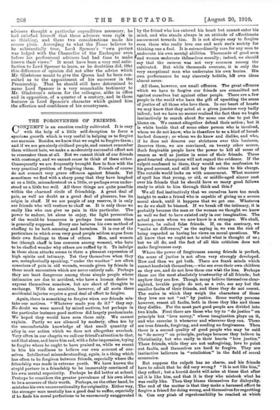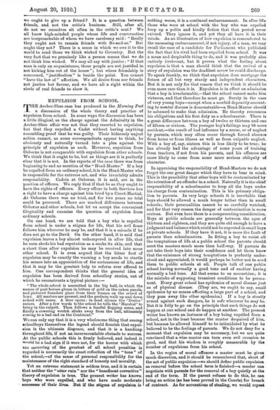THE FORGIVENESS OF FRIENDS.
CONTEMPT is an emotion readily cultivated. It is easy with the help of a little self-deception to force a spurioas growth which is very useful in helping us to forgive our enemies. Besides, we know that we ought to forgive them ; and if we are genuinely civilised people, and cannot remember them without hate, we make a moderately successful effort not to remember them at all. But we cannot think of our friends with contempt, and we cannot cease to think of them either. Oonsegnently we are frequently brought face to face with the very practical problem of forgiving them. Friends of course do not commit very grave offences against friends. Yet sometimes we find with a sharp pang that they have laughed at us a little, misunderstood us a little, or perhaps even under- stood us a little too well. All these things are quite possible within the charmed circle of friendship. A great deal of pain, as well no doubt as a great deal of pleasure, has its origin in chaff. If we are people of any reserve, it is only our friends who will venture to chaff us. It is only those we really like who can give us pain in this particular. The power to endure, let alone to enjoy, the light persecution of the would-be humorous is perhaps leas common than is generally supposed. Every one believes his own method of chaffing to be both amusing and harmless. It is one of the particulars in which even very good people seldom argue from their own feelings to those of others. Men, and women too (though chaff is less common among women), who hate to be chaffed wonder why others are ruffled by it. To indulge in these sham attacks seems to them a pleasant expression of high spirits and intimacy. Yet they themselves when they are, metaphorically speaking, " under the weather " are often conscious of pain in old wounds, wounds given by friends in these mock encounters which are never entirely safe. Perhaps they are least dangerous among those simple people whose intimacies are due to accident, who have a human desire to express themselves somehow, but are short of thoughts to exchange. With the sensitive, however, of all sorts these accidental injuries require a good deal of effort to forgive.
Again, there is something to forgive when our friends mis- take our motives. " Whatever made you do it P " they say. No doubt we were moved by mixed motives, but perhaps in the particular instance good motives did largely predominate. We hoped they would have seen those only. We cannot explain. Partly we are silenced by modesty, often too by the uncomfortable knowledge of that small quantity of alloy in our action which we dare not altogether overlook. -Very often in our chagrin we call our friend's attention to that, and that alone, and leave him sad, with a false impression, trying to forgive where he ought to have praised us, while we resent in him his readiness to believe our own account of our- selves. Intellectual misunderstanding, again, is a thing which has often to be forgiven between friends, especially where the friendship was made in extreme youth. We have known the stupid partner in a friendship to be immovably convinced of his own mental superiority. Perhaps he did better at school. Perhaps he considers the greater prevalence of his own ideas to be a measure of their worth. Perhaps, on the other hand, he mistakes his own unconventionality for originality. Either way, the stronger man mentally has a good deal to suffer, especially if he finds his moral perfections to be enormously exaggerated
by the friend who has entered his heart but cannot enter his mind, and who stands always in an attitude of affectionate amusement towards bim. It is not always easy to forgive even those who really love one and seek one's society for thinking one a fool. It is extraordinarily rare for any man to underrate his own ment,11 abilities. Thousands of good men and women underrate thAmselves morally; indeed, we should say that the reverse was not very common among the cultivated. But while thousands overrate, it is only the very exceptional man who underrates his own brains. His own performance he may sincerely belittle, hill own ideas almost never.
All these, however, are small offences. The great offences which we have to forgive our friends are committed not against ourselves but against other people. There are a few people in the world who have the gift of upsetting the sense of justice of all those who love them. In our heart of hearts we may know that they acted at a given juncture very badly indeed; but we have no sooner realised the fact than we begin instinctively to search about for some one else to put the blame on. We cannot altogether defend their action ; but it is white beside that of some other person who is involved, whom we do not know, who is therefore to as a kind of broad- backed dummy ; or whom we do know and dislike, and who, if he does not deserve our strictures over this business, deserves them, we are convinced, on twenty other scores. Such forgivable people have the power to kill all sense of reason as well as justice in some of their friends. These good-hearted champions will not regard the evidence. If the culprit confessed to them, they would set the confession to his good account, and still not lay the crime to his charge. The outside world looks on with amazement. What manner of spell has that young, or old, or middle-aged sinner cast over his friends that he should have so many good fellows ready to stick to him through thick and thin P We all feel instinctively that we ourselves have too much insight to make a friend who is capable of giving us a severe moral shock, until it happens that we get one. Whatever we do we shall be blamed. If we break off the intimacy, it is probably because the man or the woman we thought we knew so well we feel to have existed only in our imagination. The actual person whom we now know is a stranger. We shall, however, be called false friends. If, on the contrary, we "make no difference," as the saying is, we run the risk of being regarded as having lax views on moral questions. We all know that we ought not to mind what is thought of us ; but we all do, and the fact of all this criticism does not make forgiveness easy.
Where the power of forgiveness among friends is perfect, the sense of justice is not often very strongly developed. Now and then we get both. There are frank minds which cannot hoodwink themselves,—who see even their own children as they are, and do not love them one whit the less. Perhaps these are the most absolutely trustworthy of all friends ; but anyhow they are few. Though many believe themselves clear- sighted, lovable people do not, as a rule, see any but the smaller faults of their friends, and these they do not resent. The scales in which they weigh the characters of those they love are not " set" by justice. Some worthy persons however, resent all faults, both in those they like and those they dislike. For the moat part good people are divided into two kinds. First there are those who try to " do justice " on principle but "love mercy," whose imagination plays on it, and who exercise it whenever and wherever they can. These are true friends, forgiving, and needing no forgiveness. Then there is a second quality of good people who may be said to " do mercy " on principle, perhaps because they believe in Christianity, but who really in their hearts " love justice." These friends, while they are not unforgiving, love to point out faults, and themselves are hard to forgive. They are instinctive believers in "retaliation" in the field of moral economics.
But suppose the culprit has no charm, and his friends have to admit that he did very wrong ? "It is not like him," they reflect ; but a horrid doubt will arise at times that after all it is like him, and that it is they who mistook what he was really like. Then they blame themselves for disloyalty. The end of the matter is that they make a harassed effort to forgive a friend for doing wrong, and themselves for regretting it. Can any piteh of reprehensibility be reached at which we ought to give up a friend ? It is a question between friends, and not the critic's business. Still, after all, do not we ourselves sit often in the critic's seat ? We all know high-minded people whose life and conversation are irreproachable of whom we have carelessly said : " Really they ought not to remain friends with So-and-so." But ought they not? There is a sense in which we owe it to the world to send those we think wicked to Coventry. But the very fact that we genuinely like a person means that we do not think him wicked. We may all say with justice : " If that man is only an acquaintance, those people are not justified in not kicking him out of the house "; but where friendship is concerned, "justification" is beside the point. You cannot "have the law of " affection. We all desire from our friends not justice but favour, and we have all a right within the circle of real friends to show it.







































 Previous page
Previous page